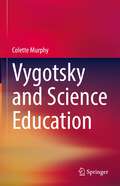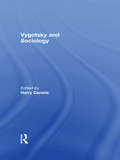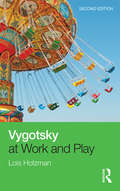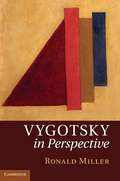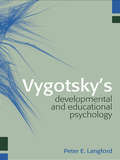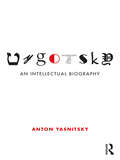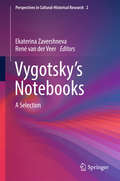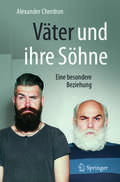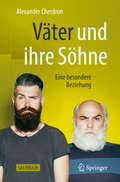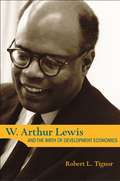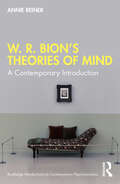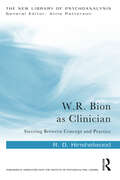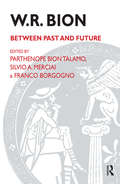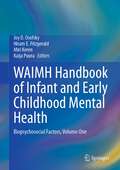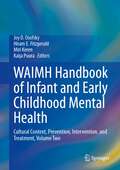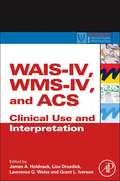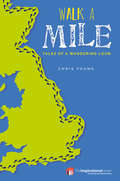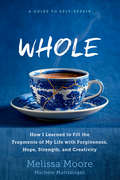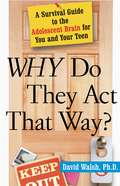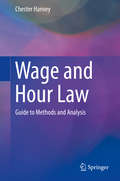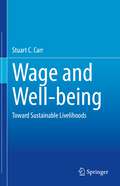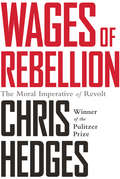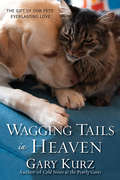- Table View
- List View
Vygotsky and Science Education
by Colette MurphyThis book highlights those aspects of Vygotskian theory which are most cogent to Science Education, including the Zone of Proximal Development (ZPD), concept development, play and imagination. Whilst these and other Vygotskian constructs apply to both research and practice in all forms of Science Education, this book employs a specific and critical focus on one or two key concepts for each context. Thus play and imagination are explored in depth in the chapter on science in early childhood learning, the ZPD is considered in depth in the primary school science chapter, and concept development in the secondary-level chapter. Chapters on higher education science learning and teaching, science teacher education, informal science learning, science education research, and the scientific endeavour itself draws on those aspects of Vygotskian theory which relate most closely. This book makes an important contribution to Vygotskian theory. Never before has it been applied so widely and comprehensively to the field of science and STEM education. The book is intended for students and academics in science and STEM education and the social sciences. It is also of interest to Vygotsky scholars and those involved in the analysis of pedagogic practice within and beyond science and STEM education.
Vygotsky and Sociology
by Harry DanielsBuilding on earlier publications by Harry Daniels, Vygotsky and Sociology provides readers with an overview of the implications for research of the theoretical work which acknowledges a debt to the writings of L.S. Vygotsky and sociologists whose work echoes his sociogenetic commitments, particularly Basil Bernstein. It provides a variety of views on the ways in which these two, conceptually linked, bodies of work can be brought together in theoretical frameworks which give new possibilities for empirical work. This book has two aims. First, to expand and enrich the Vygotskian theoretical framework; second, to illustrate the utility of such enhanced sociological imaginations and how they may be of value in researching learning in institutions and classrooms. It includes contributions from long-established writers in education, psychology and sociology, as well as relatively recent contributors to the theoretical debates and the body of research to which it has given rise, presenting their own arguments and justifications for forging links between particular theoretical traditions and, in some cases, applying new insights to obdurate empirical questions. Chapters include: Curriculum and pedagogy in the sociology of education; some lessons from comparing Durkheim and Vygotsky Dialectics, politics and contemporary cultural-historical research, exemplified through Marx and Vygotsky Sixth sense, second nature and other cultural ways of making sense of our surroundings: Vygotsky, Bernstein, and the languaged body Negotiating pedagogic dilemmas in non-traditional educational contexts Boys, skills and class: educational failure or community survival? Insights from Vygotsky and Bernstein. Vygotsky and Sociology is an essential text for students and academics in the social sciences (particularly sociology and psychology), student teachers, teacher educators and researchers as well as educational professionals.
Vygotsky at Work and Play
by Lois HolzmanVygotsky at Work and Play is an intimate portrayal of the Vygotskian-inspired approach to human development known as ‘social therapeutics’ and ‘the psychology of becoming’. Holzman provides an accessible, practical-philosophical portrayal of a unique performance-based methodology of development and learning that draws upon a fresh reading of Vygotsky. This expanded edition includes new content dealing with how Lev Vygotsky’s work can be applied to profound social issues of our times, including worsening police/community relations, authoritarianism in schools, the medical-model approach to social/emotional life, and the erosion of play in Western cultures. Holzman also weaves together Vygotsky’s discoveries with qualitative case studies from organizations that practice the approach in psychotherapy offices, classrooms, outside-of-school programs, corporate workplaces and virtual learning environments. The new edition of Vygotsky at Work and Play poses a practical-critical challenge to more traditional conceptions and methods of psychology and education, introducing performance as a new ontology and the author’s own activist research performance as a new way to do psychology. It is an essential read for researchers and professionals in educational and developmental psychology, psychotherapy, cultural historical activity, social science, performance studies and education.
Vygotsky for Educators
by Yuriy V. KarpovLev Vygotsky's approach to children's learning and development centers on adult mediation: adults engage children in age-appropriate activities and promote in this context the development of new motives and tools for thinking, problem solving, and self-regulation. Although this approach has earned widespread recognition in the global scientific community, English-speaking educators remain relatively unfamiliar with its contemporary elaborations for practical application. Yuriy V. Karpov offers the first comprehensive English introduction to contemporary elaborations of Vygotsky's ideas and their practical applications from birth through adolescence. He demonstrates the advantages of the Vygotskian approach over both traditional and constructivist education. This volume will prove an invaluable resource for educators and students in teacher education programs, as well as for everyone interested in educational and developmental psychology.
Vygotsky in Perspective
by Ronald MillerLev Vygotsky has acquired the status of one of the grand masters in psychology. Following the English translation and publication of his Collected Works there has been a new wave of interest in Vygotsky, accompanied by a burgeoning of secondary literature. Ronald Miller argues that Vygotsky is increasingly being 'read' and understood through secondary sources and that scholars have claimed Vygotsky as the foundational figure for their own theories, eliminating his most distinctive contributions and distorting his theories. Miller peels away the accumulated layers of commentary to provide a clearer understanding of how Vygotsky built and developed his arguments. In an in-depth analysis of the last three chapters of Vygotsky's book Thinking and Speech, Miller provides a critical interpretation of the core theoretical concepts that constitute Vygotsky's cultural-historical theory, including the development of concepts, mediation, the zone of proximal development, conscious awareness, inner speech, word meaning and consciousness.
Vygotsky's Developmental and Educational Psychology
by Peter E. LangfordVygotsky is widely considered one of the most significant and influential psychologists of the twentieth century. Nevertheless, true appreciation of his theories has been hindered by a lack of understanding of the background to his thought. Vygotsky's Developmental and Educational Psychology aims to demonstrate how we can come to a new and original understanding of Vygotsky's theories through knowledge of their cultural, philosophical and historical context. Beginning with the main philosophical influences of Marxist and Hegelian thought, this book leads the reader through Vygotsky's life and the development of his own psychology. Central areas covered include: * The child, the levels and consciousness* Motivation and cognition* The relevance of Vygotsky's theories to current research in developmental psychology. This comprehensive survey of Vygotsky's thought will prove an invaluable resource for those studying developmental psychology or education.
Vygotsky's Educational Theory in Cultural Context
by Alex Kozulin Boris Gindis Vladimir S. Ageyev Suzanne M. MillerInnovative ideas in educational psychology, learning, and instruction, originally formulated by Russian psychologist and educator Lev Vygotsky, are currently enjoying unprecedented popularity in the U. S. , Latin America, Europe, and Russia. An international team of scholarly contributors provides comprehensive coverage of all the main concepts of Vygotsky's sociocultural theory. They emphasize its importance for the understanding of child development, and propose specific classroom applications.
Vygotsky: An Intellectual Biography
by Anton Yasnitsky– The most famous Russian psychologist, whose life and ideas are least known? – A pioneer of psychology who said virtually nothing new? – A simple man who became a genius after he died? This fundamentally novel intellectual biography offers a 21st-century account of the life and times of Lev Vygotsky, who has long been considered a pioneer in the field of learning and human development. The diverse Vygotskian literature has created many distinct images of this influential scientist, which has led many researchers to attempt to unearth ‘the real Vygotsky’. Rather than join this quest to over-simplify Vygotsky’s legacy, this book attempts to understand the development of ‘the multiple Vygotskies’ by exploring a number of personae that Vygotsky assumed at different periods of his life. Based on the most recent archival, textological and historical investigations in original, uncensored Russian, the author presents a ground-breaking account that is far from the shiny success story that is typically associated with ‘the cult of Vygotsky’. This book will be an essential contribution to Vygotskian scholarship and of interest to advanced students and researchers in history of psychology, history of science, Soviet/Russian history, philosophical psychology, and philosophy of science.
Vygotsky’s Notebooks
by René van der Veer Еkaterina ZavershnevaThis book consists of previously unpublished manuscripts by Vygotsky found in the first systematic study of Vygotsky’s family archive. The notebooks and scientific diaries gathered in this volume represent all periods of Vygotsky’s scientific life, beginning with the earliest manuscript, entitled The tragicomedy of strivings (1912), and ending with his last note, entitled Pro domo sua (1934), written shortly before his death. The notes reveal unknown aspects of the eminent psychologist’s personality, show his aspirations and interests, and allow us to gain insights into the development of his thinking and its internal dynamics. Several texts reflect the plans that Vygotsky was unable to realize during his lifetime, such as the creation of a theory of emotions and a theory of consciousness, others reveal Vygotsky’s involvement in activities that were previously unknown, and still others provide outlines of papers and lectures. The notes are presented in chronological order, preceded by brief introductions and accompanied by an extensive set of notes. The result is a book that allows us to obtain a much deeper understanding of Vygotsky’s innovative ideas.
Väter und ihre Söhne
by Alexander CherdronDas Buch widmet sich der Vater-Sohn-Beziehung – und zwar mit Blick auf jedermann; ebenso wie es Söhnen und Vätern anregende und aufschlussreiche Lektüre sein soll, können Psychotherapeuten und Berater mit Gewinn mitlesen. Nach einem historischen Abriss der Vater-Sohn-Beziehung wird deren Wandel im Laufe der Lebensphasen für beide Beteiligten und die Veränderung der Vaterrolle, insbesondere in der jüngeren Zeit hin zum soziologischen Terminus des „modernen Vaters“, beleuchtet. Auch aktuelle Ergebnisse der Väter-Forschung finden Beachtung. Aus tiefenpsychologischer Betrachtung werden klassische Konflikte der Vater-Sohn-Beziehung aufgezeigt und mit Fallbeispielen verdeutlicht. Das Spektrum ist breit und gut lesbar: vom „Normalen“, auch gesamt-gesellschaftlich Bedeutsamen (z. B. in der aktuellen Diskussionen um die sog. Generation Y) bis hin zu den oftmals tragischen unglücklichen Folgen, pathologisch ausgetragener Vater-Sohn-Konflikte.
Väter und ihre Söhne: Eine besondere Beziehung
by Alexander CherdronDieses Sachbuch widmet sich der Vater-Sohn-Beziehung – und zwar mit Blick auf jedermann; ebenso wie es Söhnen und Vätern (und Müttern) anregende und aufschlussreiche Lektüre sein soll, können Psychotherapeuten und Berater mit Gewinn mitlesen. Es werden zunächst Aspekte beleuchtet, die Vater-Werden, Mann-Sein und Sohn-Sein heute beinhalten. Anschließend wird der Wandel der Vater-Rolle und des Vater-Bildes, insbesondere in der jüngeren Zeit, dargestellt. Untermauert durch aktuelle Ergebnisse der Väter-Forschung wird die besondere Rolle des Vaters für die Entwicklung der Söhne erläutert. Hierbei werden phasenspezifische Entwicklungsschritte und das lebenslange Wechselspiel der Gefühlswelten zwischen beiden Beteiligten „einfühlbar“. Aus tiefenpsychologischer Betrachtung werden klassische Spannungsfelder zwischen Vätern und Söhnen aufgezeigt und an Hand von Fallbeispielen verdeutlicht. Gut lesbar wird hierbei das ganze Spektrum betrachtet: von der „normalen“ Entwicklung, auch in gesamtgesellschaftlichen Kontexten, bis hin zu den oftmals tragischen Folgen unglücklich verlaufender Vater-Sohn-Beziehungen. Aus dem Inhalt: Teil I Die Vater-Sohn-Beziehung in Geschichte und Gegenwart, soziologisch und psychoanalytisch betrachtet – Teil II Kommentierte Fallgeschichten. Der Autor: Dr. med. Alexander Cherdron ist Facharzt für Allgemeinmedizin, Psychotherapeut und Psychoanalytiker in eigener Praxis in Wiesbaden.
W. Arthur Lewis and the Birth of Development Economics (Princeton Legacy Library)
by Robert L. TignorW. Arthur Lewis was one of the foremost intellectuals, economists, and political activists of the twentieth century. In this book, the first intellectual biography of Lewis, Robert Tignor traces Lewis's life from its beginnings on the small island of St. Lucia to Lewis's arrival at Princeton University in the early 1960s. A chronicle of Lewis's unfailing efforts to promote racial justice and decolonization, it provides a history of development economics as seen through the life of one of its most important founders.If there were a record for the number of "firsts" achieved by one man during his lifetime, Lewis would be a contender. He was the first black professor in a British university and also at Princeton University and the first person of African descent to win a Nobel Prize in a field other than literature or peace. His writings, which included his book The Theory of Economic Growth, were among the first to describe the field of development economics.Quickly gaining the attention of the leadership of colonized territories, he helped develop blueprints for the changing relationship between the former colonies and their former rulers. He made significant contributions to Ghana's quest for economic growth and the West Indies' desire to create a first-class institution of higher learning serving all of the Anglophone territories in the Caribbean.This book, based on Lewis's personal papers, provides a new view of this renowned economist and his impact on economic growth in the twentieth century. It will intrigue not only students of development economics but also anyone interested in colonialism and decolonization, and justice for the poor in third-world countries.
W. R. Bion’s Theories of Mind: A Contemporary Introduction (Routledge Introductions to Contemporary Psychoanalysis)
by Annie ReinerAnnie Reiner’s introduction to Wilfred Bion’s theories of mind presents Bion’s intricate ideas in an accessible, original way without compromising their complexity. Reiner uses comparisons to painting, literature and philosophy, and detailed clinical examples, to provide an experience of Bion’s work that can be felt as well as thought. The book explores many of Bion’s theoretical and clinical innovations, and examines the controversy surrounding his concept of O. Reiner provides evidence of a continuity between Bion’s early ideas and his later, more esoteric work. W. R. Bion’s Theories of Mind will be essential reading for psychoanalysts and psychoanalytic candidates, as well as students of psychoanalytic and psychological history, and anyone looking for a readable introduction to Bion’s work.
W.R. Bion as Clinician: Steering Between Concept and Practice (New Library of Psychoanalysis)
by R. D. HinshelwoodUnderpinned by rigorous close readings of his oeuvre, this book provides a comprehensive guide to the development, practice and evolution of Wilfred Bion’s clinical psychoanalytic work. Starting with the significance of Kant during Bion’s years as a student, the author traces the key influences on Bion in his psychoanalytic and personal development, progressing through Bion’s particularly productive pre-psychoanalytic work based on social field theory, his well-known elaboration of Klein’s schizoid mechanisms known as the theory of containment, all the while with his deeply thoughtful clinical approach inspired latterly by an understanding of literary creativity. Extending this unique emphasis on Bion’s clinical work, rather than his theory, Hinshelwood also explores how Bion’s early traumatic experiences helped shape his attitudes and approach to effective clinical work. With comprehensive coverage of the key tenets of Bion’s work, this should be essential reading for psychoanalysts and psychotherapists in practice and in training who seek a clear guide to the practical applications of his theory.
W.R. Bion: Between Past and Future
by Franco Borgogno Parthenope Bion Talamo International Centennial Conference on the Work of W. R. Bion Léon Grinberg Silvio A. MerciaiA collection of papers on and about the work of Wilfred Bion and its continuing development. Most were presented at the International Centennial Conference on the work of Bion in Turin in 1997. Contributors include Francesca Bion, Andre Green, James Grotstein, and many others. “How are we to become wise when so much emphasis is placed on cleverness, on building increasingly complex substitutes for thought? Where does wisdom come on a scale measuring success?” So writes Francesca Bion, when considering her husband’s work. A fitting tribute to Bion would be a collection of papers containing passionate attempts at thinking, not substitutes for thought. In this book, concern with psychic life, far from being dead, reaches new places, takes deeper, more nuanced turns. Authors penetrate subtly into our lying ways and soundly appreciate the complexities of our hunger for truth and experience.
WAIMH Handbook of Infant and Early Childhood Mental Health: Biopsychosocial Factors, Volume One
by Hiram E. Fitzgerald Miri Keren Joy D. Osofsky Kaija PuuraThis book examines basic knowledge in the field of infant and early childhood mental health. It focuses on cognitive, social, and emotional development of infants and toddlers and examines different aspects of neurobiological development, including genes and epigenetics as well as biobehavioral synchrony. In addition, the book addresses parenting and caregiving issues, including attachment, parent-infant relationships, and high-risk factors (e.g., the effects of trauma on the infant-caregiver relationship, adolescent parenting, and parents with substance abuse disorders).Key areas of coverage include:Social-emotional and cognitive development during infancy and early childhood.Temperament in infants and toddlers.Neurobiological influences from infancy through early childhood.Parenting and caregiving of infants and toddlers.Reflective functioning, mentalization, and infant development.The WAIMH Handbook of Infant and Early Childhood Mental Health, Volume One, is a must-have reference for researchers, professors, and graduate students as well as clinicians and all related therapists and professionals in infancy and early child development, developmental psychology, pediatrics, child and adolescent psychiatry, clinical social work, public health and all related disciplines.
WAIMH Handbook of Infant and Early Childhood Mental Health: Cultural Context, Prevention, Intervention, and Treatment, Volume Two
by Hiram E. Fitzgerald Miri Keren Joy D. Osofsky Kaija PuuraThis book focuses on cultural variations and perspectives in infant and early childhood mental health and describes parenting / caregiver-young child relationships across the globe, including countries in Europe, Asia, South America, South Africa, the Middle East, and the United States. It examines infant and early childhood assessment issues, such as infant-parent/caregiver observations that comprise an important component of assessment during the earliest years. In addition, the book presents different clinical interpretations, practices, and treatment approaches in infant mental health (e.g., evidence-based treatments and promising practices). It explores ways to help support and provide clinical interventions and treatment for infants, toddlers, and their families within the home, clinic, and community-based environments.Key areas of coverage include:Systemic assessment of adverse childhood experiences (ACEs).Infant and early childhood mental health assessment in indigenous contexts.Psychodynamic approaches in infant mental health.Evidence-based therapeutic interventions for very young children.Community-based interventions in infant mental health. The WAIMH Handbook of Infant and Early Childhood Mental Health, Volume Two, is a must-have reference for researchers, professors, and graduate students as well as clinicians and all related therapists and professionals in infancy and early child development, developmental psychology, pediatrics, child and adolescent psychiatry, clinical social work, public health and all related disciplines.
WAIS-IV, WMS-IV, and ACS: Advanced Clinical Interpretation (Practical Resources for the Mental Health Professional)
by James A. Holdnack; Lisa Whipple Drozdick; Lawrence G. Weiss ; Grant L. IversonThis book provides users of the Wechsler Adult Intelligence Scale (WAIS-IV) with information on applying the WAIS-IV, including additional indexes and information regarding use in special populations for advanced clinical use and interpretation. The book offers sophisticated users of the WAIS-IV and Wechsler Memory Scale (WMS-IV) guidelines on how to enhance the clinical applicability of these tests.
WAM: Tales of a Wandering Loon (Inspirational Series)
by Chris YoungAs a kind, chatty, and good-humoured man with a zest for life and a passion for helping people, Chris Young adored his job as a social worker. But things fell apart when, in 2008, he was diagnosed with borderline personality disorder. His illness brought about the end of his calling and he found himself in need of a new project and purpose.And so it came to be that in 2011, Chris began a campaign called Walk a Mile In my Shoes. He walks around the edge of the UK – the edge of society being where many people with mental health problems feel they are – without spending any money and relying on the kindness of strangers.In 2015, he joined forces with See Me Scotland to distil the success of the coastal walk into a series of events, inviting other people to join him and discuss mental health. He encouraged them to literally walk a mile in each other's shoes. Walk a Mile: Tales of a Wandering Loon is the story of how a normal, nurturing childhood turned into one of neglect and abuse and how this, combined with a little faulty brain wiring, led to a severe and enduring mental illness.
WHOLE: How I Learned to Fill the Fragments of My Life with Forgiveness, Hope, Strength, and Creativity
by Melissa Moore Michele MatriscianiA five-point plan to usher you through heartache and toward a stronger, healthier place.“I know how to kill someone and get away with it.” The words spoken by her father when Melissa was a teen haunt her to this day. Two years later, after confessing that he was the serial killer nationally known as the Happy Face Killer, Keith Jesperson was arrested for the murder of eight women. The pain, guilt, and shame that followed her father’s conviction stigmatized Melissa for years until she figured out a way to use her emotions as fuel to free herself from self-imposed limits and set out on a journey to rebuild her fragmented life.Through her work as an Emmy-nominated investigative journalist, television host, educator, and advocate, Melissa created WHOLE, a five-step program to better develop her own approach to healing: Watch the Storm, Heal Your Heart, Open Your Mind, Leverage Your Power, and Elevate Your Spirit.Among other things, she found that the commitment to your core values makes all the difference in getting unstuck; that forgiveness gives the greatest chance of making a future not defined by the past; that there is great value in vulnerability; that creativity is essential to living a full life; and that hope is the basis for everything we feel, believe, and do.In each phase of the program, Melissa inspires you to embrace your past to find wholeness within the parts of your life that you believe to be “broken.” If you are stuck in the rut of a painful experience—whether depression, trauma, pain, fear, addiction, or guilt—you will find comfort in this book’s advice, self-evaluation, and action plans.WHOLE is a powerful journey of recovery and awakening that reframes the pain experience so it can be used as a way to invite understanding, growth, and transformation into your life.
WHY Do They Act That Way?
by David Walsh Nat BennettIn this national bestseller, acclaimed, award-winning psychologist Dr. David Walsh explains exactly what happens to the human brain on the path from childhood into adolescence and adulthood. Revealing the latest scientific findings in easy-to-understand terms, Dr. Walsh shows why moodiness, quickness to anger and to take risks, miscommunication, fatigue, territoriality, and other familiar teenage behavior problems are so common -- all are linked to physical changes and growth in the adolescent brain. Why Do They Act That Way? is the first book to explain the changes in teens' brains and show parents how to use this information to understand, communicate with, and stay connected to their kids. Through real-life stories, Dr. Walsh makes sense of teenagers' many mystifying, annoying, and even outright dangerous behavioral difficulties and provides realistic solutions for dealing with everyday as well as severe challenges. Dr. Walsh's techniques include, among others: sample dialogues that help teens and parents talk civilly and constructively with each other, behavioral contracts, and Parental Survival Kits that provide practical advice for dealing with issues like curfews, disrespectful language and actions, and bullying. With this arsenal of strategies, parents can help their kids learn to control impulses, manage erratic behavior, cope with their changing bodies, and, in effect, develop a second brain.
Wage and Hour Law: Guide to Methods and Analysis
by Chester HanveyThis practical guide offers management, psychology, and related professionals comprehensive background in—and robust methods for evaluating—frequently litigated wage and hour issues. Wage and hour compliance is impacted by numerous sources including federal laws such as the Fair Labor Standards Act, state and local laws, guidance from government enforcement agencies and court decisions. This book provides a clear and understandable overview of the legal context along with methods for data collection and analysis to measure and evaluate compliance pertaining to commonly litigated disputes, such as independent contract classification, FLSA exemptions, pay equity, and off-the-clock work. This framework for understanding and responding to such cases is suitable to both those new to the field and expert consultants while also acting as a springboard for further research in this increasingly relevant legal area. Included in the coverage: · Trends in wage and hour litigation. · Applicable data collection methods for evaluating wage and hour compliance. · Assessing employment status. · Strategies to measure and prevent off the clock work. · Factors that impact meal and rest break compliance. · Stages of a class-action lawsuit. · Statistical sampling and analyses. · Understanding and analyzing pay equity. Wage and Hour Law: Guide to Methods and Analysis fills knowledge needs for an audience that includes management and industrial/organizational psychology graduate students interested in legal issues as well as testifying experts, external consultants, HR practitioners, management professionals, and labor economists.
Wage and Well-being: Toward Sustainable Livelihood
by Stuart C. CarrThis book examines the links between work wage and wellbeing, drawing on the new specialism of Humanitarian Work Psychology and the United Nations Sustainable Development Goals (SDGs). Humanitarian work psychology foregrounds people before profit, not wages before people. It resonates with the SDGs through the Decent Work Agenda, a policy program that stresses a number of humanitarian concerns: standards and rights at work, employment creation and enterprise development, social protection and social dialogue. These standards and forms of dialogue, from the living wage standard to new diplomacies for inclusive policy dialogue, appear and re-appear throughout the following chapters and sections in the book. The book synthesizes job characteristics models and psychology of working approaches with job evaluation techniques, poverty trap theory, diminishing marginal returns, work justice theory, the social psychology of equality and inequality, and a range of literatures on wellbeing that crisscross the social sciences.
Wages of Rebellion
by Chris HedgesIn the face of modern conditions, revolution is inevitable. The rampant inequality that exists between the political and corporate elites and the struggling masses; the destruction wreaked upon our environment by faceless, careless corporations; the steady stripping away of our civil liberties and the creation of a monstrous surveillance system--all of these have combined to spark a profound revolutionary moment. Corporate capitalists, dismissive of the popular will, do not see the fires they are igniting. In Wages of Rebellion, Chris Hedges--a renowned chronicler of the malaise and sickness of a society in terminal moral decline--investigates what social and psychological factors cause revolution and resistance. Focusing on the stories of radicals and dissenters from around the world and throughout history, and drawing on an ambitious overview of prominent philosophers, historians, and novelists, Hedges explores what it takes to be a rebel in modern times. Hedges, using a term coined by the theologian Reinhold Niebuhr, cites "sublime madness” as the essential force that guides the actions of rebels--the state of passion that causes the rebel to engage in an unwavering fight against overwhelmingly powerful and oppressive forces. From South African activists who dedicated their lives to ending apartheid, to contemporary anti-fracking protestors in Canada, to whistleblowers in pursuit of transparency, Wages of Rebellion shows the cost of a life committed to speaking truth to power and demanding justice. This is a fight that requires us to find in acts of rebellion the sparks of life, an intrinsic meaning that lies beyond the possibility of success. For Hedges, resistance is not finally defined by what we achieve, but by what we become.
Wagging Tails in Heaven: The Gift Of Our Pets' Everlasting Love
by Gary KurzThe acclaimed author of Cold Noses at the Pearly Gates reveals the truth about cats, dogs, and their heavenly afterlives. Will our departed pets greet us on the other side? Are their spirits watching and protecting us right now? Will they be happy? If you've ever loved and lost a pet, you understand the power of a truly special bond. Animal or human, we are all God's creatures—and the love we share must surely be eternal. In this enlightening book, author Gary Kurz offers surprising and comforting evidence of an animal afterlife. Wagging Tails in Heaven reveals what the Bible says about the souls of animals; how pet angels devote themselves to humanity; what your dog or cat might look like in heaven; and what to expect when you&’re reunited on a spiritual plane. It also shares amazing firsthand accounts of &“ghost pet&” visitations, animal communications from beyond, and heartwarming tales of heroism, loyalty, and everlasting love.
